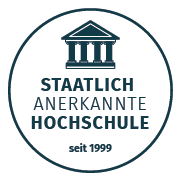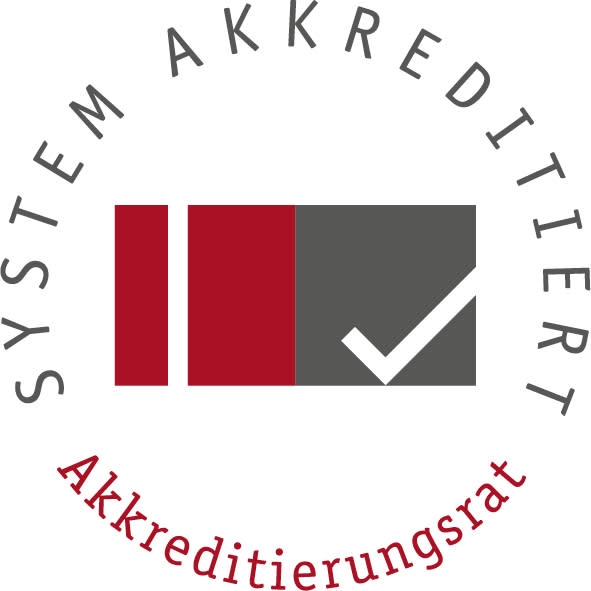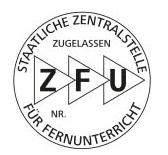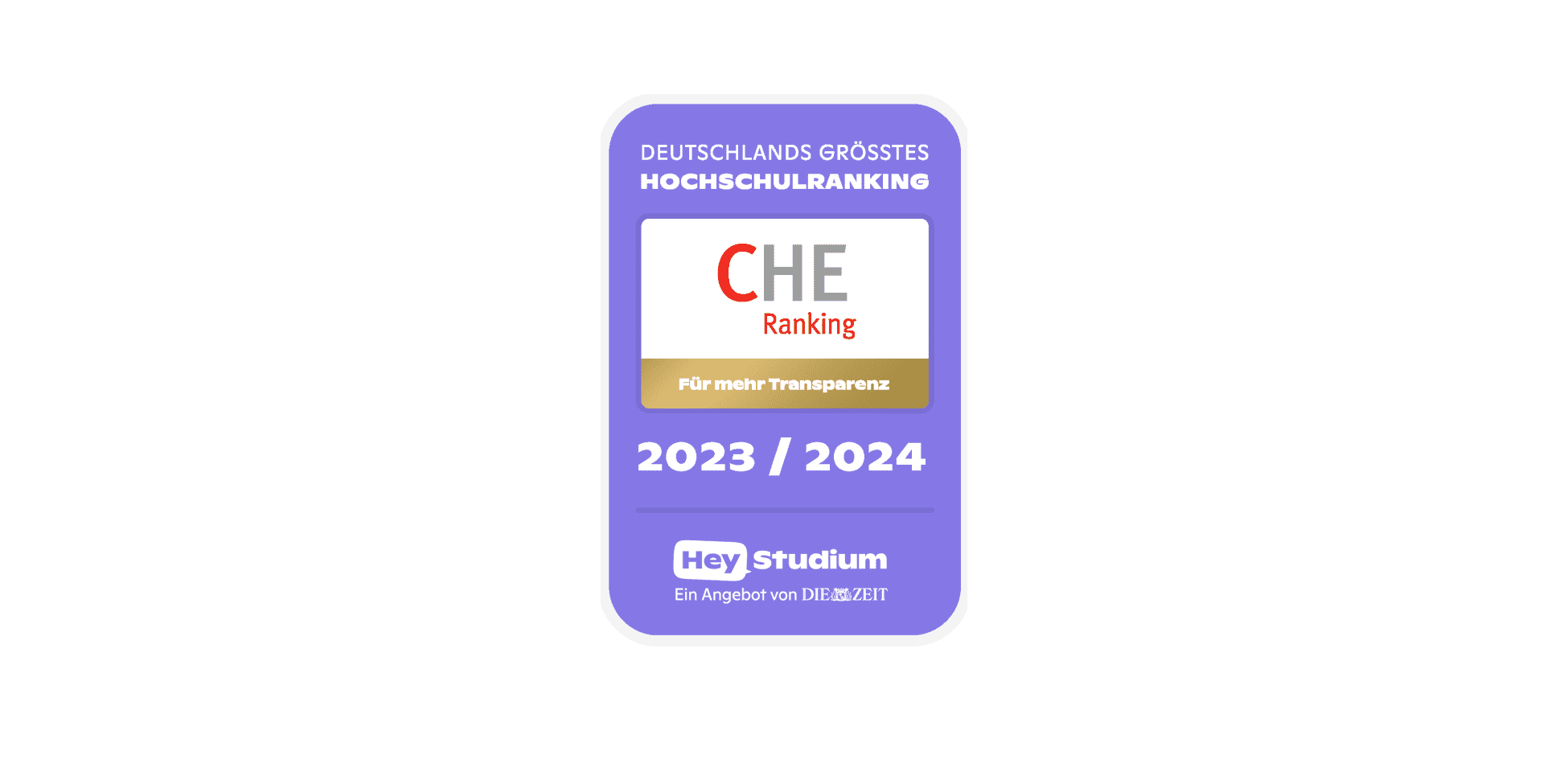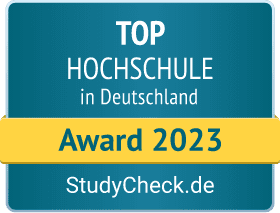General questions about IU
IU International University of Applied Sciences is a private university whose programs of study are accredited but not financed by the state. That is why we have to charge a fee for the course of study. In the dual study model of IU, these tuition fees are usually taken over by the company for the students and remuneration for internships is also paid to a certain extent.
The term "accreditation" refers to the recognition of higher education institutions or study programmes according to certain criteria to guarantee the quality of teaching and studies. In addition, it is intended to increase the transparency of degree programmes and improve the international comparability of degrees. The institutional accreditation of private universities is carried out by the German Council of Science and Humanities, while the accreditation of degree programmes at state-recognised universities is carried out by special accreditation agencies. The relevant principles are set out by the Accreditation Council.
Yes, IU was re-accredited in 2021 for a period of 5 years.
There are now 100,000 people studying at IU. We have years of experience excellent feedback from our students, whether in distance learning, part-time or dual studies. We are only successful when our students are successful.
Questions about your study programme
You can choose the programme that is most appealing to your respective stage of life and custom design it depending on the form of study that best suits you. In general, there are three forms of study available: In distance learning, you can study 100% online, regardless of the time and place, and without any mandatory attendance requirements. With myStudies, you choose yourself whether you want to study on campus or online. Another alternative is our dual studies programme, in which you spend about half of your time in a company and the rest of the time on campus.
That is entirely your decision: Our degree programmes can be studied either full-time or part-time. In the case of a full-time programme, you will take modules worth 30 ECTS points per semester (which corresponds to a total workload of 900 hours). However, you are also welcome to book a smaller number of courses per semester. In each time model, your studies can be extended by 12 months free of charge.
We put a great emphasis on interactivity. For this purpose, in addition to the scripted study materials, we will provide you with numerous online learning materials. These includes, for example, digital study scripts as PDFs as well as interactive e-book versions, self-tests, learning videos and, in selected courses, tutorials, revision sessions or interactive teaching events.. Furthermore, you can exchange knowledge with other students via our virtual campus and also consult with your academic supervisors at any time.
Yes. Simultaneously with your registration at our university, you will receive login details for our online library, where you can research literature and in some cases also read it directly as an e-book.
IU currently has more than 30 locations in Germany and more than 45 examination centres where you can take your exams.
At our virtual campus you can study comfortably from home and take your exams online.
You can manually request the study letter by post once the module has been made available. Generally, shipping takes between 3-5 days. Simultaneously, all online materials will be unlocked so that you can start studying the new content immediately.
Where can I find more information about the different study forms?
Yes, IU offers you the option to complete a master’s degree with IU distance learning.
Depending on the programme, you will conclude your studies with a state-recognised and accredited Bachelor's or Master's degree.
The standard period of study for a full-time bachelor's degree is 36 months (exception for dual studies: 42 months). If you know from the start that you will need more time for your studies, the distance learning study model offers you the option of choosing the extended study period of 48 months (part-time 1) or 72 months (part-time 2) in advance.
The standard period of study for the full-time master's degree is 24 months. Here, too, we offer part-time variants that have a duration of 36 and 48 months.
In each time model, you can also extend your studies for 12 months free of charge in both the bachelor's and master's programmes.
Yes. In order to take a break from your studies, we offer you the option of taking a semester off in our distance learning and myStudies programmes. During this time, your studies will be suspended and you will not have access to the online campus or your learning materials. However, we will not charge any fees during your time off.
Taking a leave of absence is possible from the second semester onwards. In total, the leave of absence may not exceed half of the standard period of study of your degree programme (e.g. a maximum of three semesters of leave for a six-semester Bachelor's programme).
Need more time? You can also extend the standard period of study in any study model by up to 12 months free of charge. We offer you maximum flexibility!
The entire IU study programme is computer-based to a large extent. Therefore, good IT equipment is important. In order to use the IU Online Campus, you will need a PC with an Internet connection or other suitable Internet-capable devices. The online campus also gives you access to our comprehensive online library, where you can research literature and, in some cases, read it directly as an e-book.
In order to be able to use all software applications to the full extent, we recommend the following minimum system equipment:
Operating system
Microsoft operating systems: Windows 10 (or newer)
Macintosh operating systems: Mac OS 11.0 (or newer)
processor: At least Duo Core, 2.4 GHz
Memory: 8 GB RAM or more, 5 GB free hard drive space
Internet access: Download at least 3 Mbit/s (or more, test here)
Browser
Mozilla Firefox, Google Chrome (specifically for online exams: Guardian Browser)
Plug-ins: Current Adobe Flash Player (latest version), current Adobe Acrobat Reader (latest version)
Sound card (with speakers/headphones and microphone)
Screen resolution: 1366x768
only for online exams: ideally a plug-in Webcam
Yes, all students at IU International University of Applied Sciences receive their personal student ID card. You can access your student card directly in the browser version of the IU Learn app!
After your study start, you can test our distance learning and myStudies programme for one month free of charge and without obligation. During this time, all IU offers and services will be available to you. If you decide that studying with us is not right for you, you can cancel your studies free of charge within this month. If you like your studies, you can simply continue studying after the trial period. In this case, your first month will count as a regular study period for which a fee will be charged. We will only charge you for the first month after the end of the trial phase.
Until the end of the first five months, the contract can be terminated with a notice period of one month to the end of a full month in relation to the start of the contract. Later, you will be free to terminate the contract at any time with three months' notice (in each case at the end of a full month, in relation to the start of the contract). Notice of termination must be given in text form, for example via our form.
Feel free to contact our student advisory service by email or phone. Our experienced colleagues are available to talk to you personally and support you in your decision.
You will find it here. The IU Study Finder supports you in finding your individual study programme that ideally suits your interests and life circumstances. Perfect if you are asking yourself: Which form of study suits me? And even more detailed: Which degree programmes suit me?
Questions about application & admission
You can apply for a study programme via our website at any time. Next, you submit your documents and we will contact you once we have reviewed them.
Would you like to start a bachelor's or master's degree programme with us? You can find out which requirements you need to meet in order to start your desired study programme directly on the programme's page.
You can find more information on who can study at IU here.
It is possible to study at IU without a university entrance qualification (""Abitur"" or ""Matura"") if you can prove that you have completed at least two years of vocational training followed by at least three years of full-time professional experience.
Alternatively, we also accept an advanced vocational training certificate. You can find further information on the individual programme pages under ""Admission"".
Here you can find further information on how to study at IU without A-levels.
Have you already studied at a higher education institution in Germany and dropped out? No problem, you can continue your desired course of study with us and successfully complete it. For this, we need your exmatriculation certificate specifying the reason for your exmatriculation, which can be issued by your former institution.
Did you start a study programme and were you forcibly ex-matriculated? Together, we'll take a look at how you can complete your higher education with us. In the online application, just choose your desired study programme and send us the following documents: Exmatriculation certificate stating the reason for exmatriculation, transcript of records (ToR), curriculum and the module handbook of your previous course. We must conduct a review of the contents of the programmes before admission. If you are granted admission, you can start your desired programme.
Based on your previous education, we may even be able to credit you with achievements from a previous programme. Not only can that shorten the duration of your studies, but even save you money: 30 euros per recognized ECTS point! We are happy to check your individual options.
For this 120 ECTS master's programme, we offer you the opportunity to qualify without a bachelor's degree if you have many years of professional experience as a manager or expert.
Admission requirements are:
General Admissions requirements
Secondary School Leaving Certificate or
Completed vocational training of at least two years (GQF level 4) with relevance to the desired study programme
Professional experience
At least 6 years of professional experience relevant to your preferred study programme, at least 3 years of which in a leading or expert role: Proof must be supplied using certificates of advanced vocational training (GQF level 6), employer references, letters of recommendation, written confirmations by the employer or similar certifications
Passing of preparatory module* at IU International University of Applied Sciences (IU)
The preparatory module* at IU consists of two parts:
Seminar paper (approx. 40 pages), time for completion: 12 weeks (full-time)
Oral exam of 30 minutes
* One-time fee for your preparatory module: 500€ (includes attendance of the course “Academic Work”). The preparatory module can only be attended at IU. If you start your master’s programme at IU based on this preparatory module, you cannot switch to another university within this master’s programme.
Find out more about our Master's for Professionals here.
Questions about financing your studies
You can find information about the costs of our distance learning and myStudies programme in the corresponding pages of the programme.
Your practice partner will pay your tuition fees for your dual study programme at the IU.
For this purpose, we have created a separate information section on financing, in which we provide information on various financing options, grants and scholarship programmes.
Yes, you can pay your tuition fees in monthly instalments, for example. You can get more information about this from our student advisory service.
Tuition fees for the distance learning and myStudies programmes are payable monthly and will be charged for the first time after the expiry of the withdrawal period. Graduation fees must be transferred by you at the time of the final exam. The graduation fee is due when you register for the final examination (colloquium) and must be paid within 14 days.
Yes. For detailed information on how you can deduct your IU study expenses from your taxes, please visit our financing section.
Are you looking for a financing concept that suits you perfectly? Discover your financing options for distance learning, part-time studies, dual studies and myStudium.
Questions about recognition of previous achievements
Yes, if you have already completed a degree programme at a university or a vocational training or advanced education programme, you can have your previous achievements recognised comparably for your degree programme at any time. If applicable, relevant professional experience can also be recognised for your studies.
You can find further details in our information section on the recognition of previous achievements. If you have any further questions, please contact our student advisory service to organise a review of your previous achievements.
If you have completed vocational training, you have the opportunity to complete your IU degree programme much faster and save on tuition fees. By having your previous achievements recognised, you can skip modules or entire semesters that match the content of your training and thus shorten the duration of your studies by up to 50%. This also reduces your costs. With our top-up study programmes, you benefit in particular from your training.
For some degree programmes, we have designed flat-rate recognition options that allow you to claim entire apprenticeships and thus save up to 60 ECTS credits in your studies. In addition, many contents of other vocational qualifications are also recognised. Submit your online application for recognition now to find out how much you can save.
For us to be able to assess your previous achievements, it is important that you complete and sign the application for recognition of previous achievements and send it to us. Please enclose all your relevant documents with this application so that we can process your application. You can find the applications and the corresponding guidelines on the websites of the individual degree programmes. There you can also find out which of your previous degrees, certificates or professional experience and skills you can actually claim for recognition. We will also be happy to review in advance whether and to what extent your previous achievements can be taken into account. You do not have to enrol directly for this! A review is also possible without certified copies.
With the recognition of prior achievements, you can reduce both your study time and your tuition fees. Your previous achievements can really pay off! You will save 30 euros per recognised ECTS credit. You will not have to retake courses that have already been recognised.
The maximum number of ECTS credits that can be awarded for non-academic competences is 50 percent of the ECTS credits that can be achieved in the degree programme.
University credits can be recognised in full - with the exception of final theses. In principle, theses from external colleges/universities are not recognised, as the thesis is an elementary part of the degree programme.
Recognition of your achievements from a degree programme (university achievements):
Transcript/record of academic achievements and ECTS-CP/hours
Module handbooks & course contents (German or English)
For academic achievements at foreign universities: overview of their grading system
Recognition of your achievements from vocational training/advanced education:
Official proof of the completed vocational training or advanced training (e.g. IHK Examination certificate, Certificate of participation)
Description of the imparted technical contents - proof of the achievements and number of teaching hours
In the case of further education at foreign institutes: Overview of their grading system
Recognition of your certificates:
Description of the contents taught and/or proof of the duration of the course.
Recognition of your work experience:
Official proof of employment from the employer including the following information: Detailed description of the function, the tasks and the time period.
Please use the form "Employer's confirmation (Bachelor)" or "Employer's confirmation (Master)".
or
Alternatively, submit a professional letter of recommendation (including all of the above-mentioned information).
General remark:
In exceptional cases, we reserve the right to request certified copies.
The top-up study programmes at IU are study programmes that build on specific vocational training and can only be completed with this training. You save 90 ECTS credits in the top-up programme with your training. This means that the duration of your studies and the fees are reduced by 50% and you can graduate in just three semesters.
How to: Recognition of previous achievements
You have already completed an apprenticeship, have been working for several years or have previously studied at another university? Perfect! If so, you can have certain prior learning and study achievements recognised in order to shorten your study time and reduce your tuition fees by 30 euros per each recognised ECTS credit.
Glossary
Alumni
Alumni are former students who have already successfully completed their studies. = Graduates
Auditorium
Refers to a lecture hall at a college or university.
Canteen
The canteen is the culinary meeting point for students, a “restaurant for students”, so to speak.
Campus
A campus is the name given to a college or university physical location. An “online campus” is a campus where students can exchange information via e-learning platforms.
CBT
CBT stands for “computer-based training” and describes learning without direct contact with a professor or tutor, e.g. by using learning software.
Colloquium
A colloquium is an oral examination or compulsory defence within the framework of a subject-related or final dissertation.
Colleagues
Your colleagues are your fellow students.
Cum laude Cum laude is a grade in Latin which means “with honour”. It is mainly used when evaluating doctoral theses.
Curriculum
Curriculum refers to the content structure or study plan of a degree programme.
E-learning
Refers to learning and teaching with the help of various electronic media.
ECTS
The “European Credit Transfer and Accumulation System” (ECTS) is a Europe-wide system for accumulating, crediting and transferring academic achievements For example, 60 ECTS credits are given for a full academic year.
Enrolment
Enrolment is the process of registering at a college or university. Once you have enrolled, you can begin your studies. The term matriculation is often used as a synonym.
Exam
Exams are tests that are performed with the aim of testing your level of knowledge in written or oral form.
Graduate
Graduates are students who are in the final phase of their studies or are taking their final exams.
Institute
A college or university is divided into various faculties. These in turn can be subdivided into independent institutes, which are headed by professors.
Magna cum laude
Magna cum laude is a grade given in Latin. Translated, it means “with great honour”, and is awarded, for example, for doctoral theses.
Master
A Master’s degree refers to the course of study that follows a Bachelor’s degree or an undergraduate degree. It takes approximately 2 to 4 semesters to complete.
Matriculation
Enrolment is a synonym for matriculation.
Podcast
The term “podcast” is made up of the words “iPod” and “broadcasting” and refers to short audio recordings of various teaching subjects for playback.
Professor
A professor is a person who teaches at a college or a university.
Virtual classroom
In a virtual classroom, courses with other students and tutors or professors can be held live over the Internet.
Vodcast
The term “vodcast” is a combination of the words “video” and “broadcasting” and refers to short video recordings on various teaching subjects.
WBT
WBT stands for “Web-Based Training” and generally refers to learning and practising course content via the Internet or other special platforms.
Written test
Written tests are examinations taken by students at the end of a course or module.
Bachelor (B.A., B.Sc. or B.Eng.)
The Bachelor's degree is an undergraduate degree that one receives after about 6 to 8 semesters. You can then start a Master's programme.
BAföG
The Federal Training Assistance Act (BAföG) in Germany regulates state support for students and is a social benefit programme.
Dean
Deans are elected professors who represent the interests of a faculty.
De-registration
De-registration is the opposite of enrolment. This means that a student is no longer enrolled at a college or university because, for example, he or she has completed his or her studies or has been excluded by the faculty for a given reason.
Dissertation
A dissertation is a synonym for a doctoral thesis, a scientific work on a specific topic. It is a prerequisite for obtaining a doctorate.
Distance learning
A form of study that you can complete remotely and not via in-person lectures.
Doctorate
A doctorate is a final dissertation for prospective doctorates, who are awarded the title upon completion.
Faculty
A faculty refers to a special department at a university or college. This can be, for example, the department of law, mathematics, medicine or similar. Each faculty is represented by a dean.
Habilitation
A habilitation is an academic thesis to obtain a professorship in a subject area.
Learning Management System (LMS)
The term “learning platform” refers to a system through which students can work on their documents online and exchange information with others.
Lecture
A lecture is a course at a university.
Numerus clausus
The admission restriction for individual subjects due to a high number of prospective students is called numerus clausus.
Semester
Semester is the term used for describing a six-month period.
Scholarship
A scholarship is financial support for students and also serves to reward gifted students.
Standard period of study
This describes the regular duration of a full-time course. The standard period of study is specified in the examination regulations.
Tutor
Tutors are part of the teaching staff and represent a department.
Tutorials
Tutorials are short courses taught by tutors.
WBT
WBT steht für Web based Training und bezeichnet im Allgemeinen das Lernen und Üben von Studieninhalten über das Internet bzw. spezieller Plattformen.
What you get for free
Information on study content & electives
Information on career prospects
Information on financing options
Do you still have questions?
Our free student advisory service has all the answers for you! We take the time to advise you individually and without obligation.






